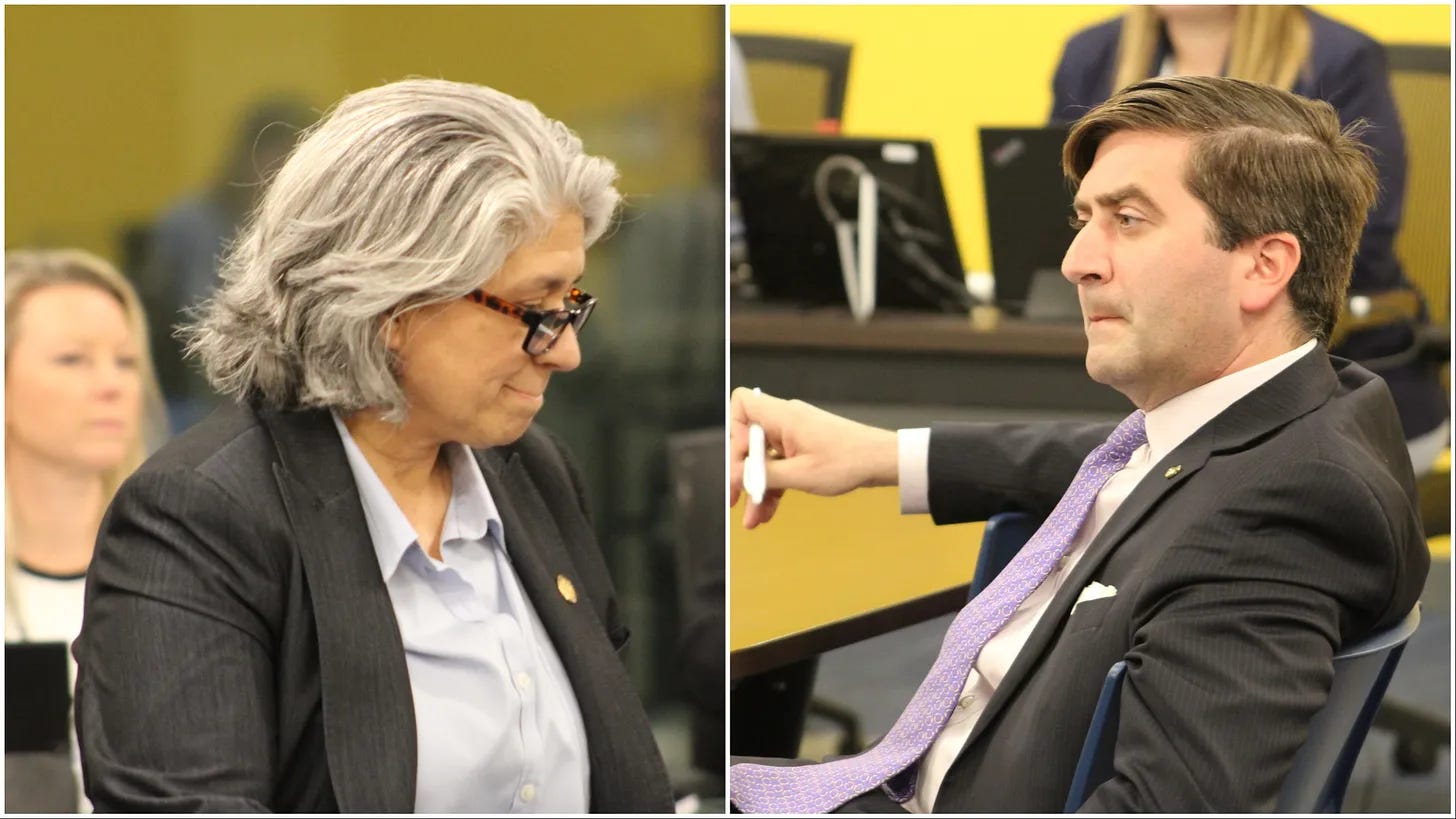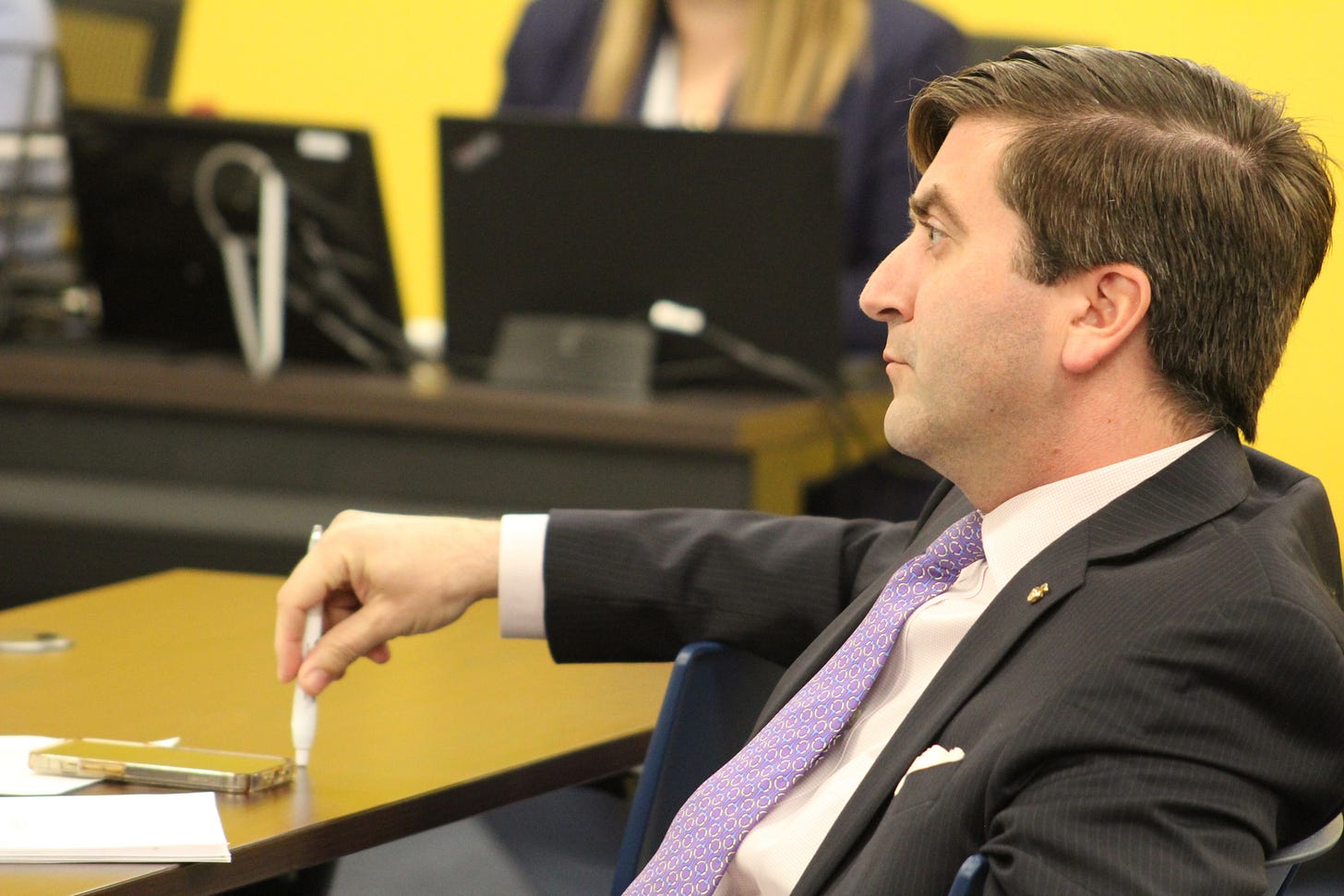A contentious Senate race
Democratic Sen. Lisa Grafstein went from one of the bluest seats in the Senate to a tossup district. Republican Scott Lassiter is looking to flip it to cement a GOP supermajority.

With the gubernatorial race increasingly looking like a win for Democratic Attorney General Josh Stein, North Carolina party leaders are sharpening their focus on legislative races. And the outcome of a handful of contests could very much shape the policy direction of the state for the next two years.
In both the House and Senate, Republicans hold veto-proof control by the slimmest possible margin. While GOP lawmakers have crafted more favorable legislative voting maps for themselves going into the 2024 election, Democrats have ample opportunity to break it, particularly on the House side.
In the Senate, Democrats have a tougher task. They’ll have to throw a near perfect game to prevent Republicans from maintaining their supermajority.
That will include defending the seat of state Sen. Lisa Grafstein of Wake County, the chamber’s lone out LGBTQ member.
When Republicans double-bunked Grafstein into Senate Democratic Whip Jay Chaudhuri’s district, Grafstein moved to a new home in order to meet a state law requiring legislative candidates to have lived in the district they’re vying for at least one year before the general election.
“They created it to be a tossup district to make it easier to try to grab one for a Republican,” Grafstein said. “I don't know that they anticipated that I would move into the district.”
While Democrats have rallied behind Grafstein, things haven’t been nearly as smooth sailing for Scott Lassiter, an assistant principal who is perhaps most known for a lawsuit he filed against House Speaker Tim Moore for having an affair with Lassiter’s wife. Lassiter and Moore reached a private settlement last year, with the terms of the deal not being disclosed.
“That was an unfortunate personal matter that unnecessarily played out in the public,” Lassiter said.
Publicly and privately, several Republican party leaders sought to prevent Lassiter from securing the GOP nomination. Party insiders, including a firm led by a former aide to Senate leader Phil Berger, backed coffee shop owner Vicki Harry during the primary. Another telling sign of the GOP’s internal resistance to Lassiter: The initial $5.6 million ad buy Republicans placed over the summer for Senate candidates went to three hopefuls, none of whom were Lassiter.
While this race may not wind up being the closest of the four Senate races worth watching, it could prove to be highly consequential.
If Democrats break the GOP supermajority, Republicans would be forced to collaborate with Democrats.
“Breaking the supermajority means that the Republicans actually have to negotiate with the Democratic governor and the Democratic members of the legislature on important things like teacher pay and whether we're going to really go forward with this corporate tax cut,” Grafstein said. “That, to me, is phase one, where we can start to change the tide and stop the bleeding in what I think is bad policy.”
If Republicans maintain full control of the legislature, the power of any governor would be greatly diminished, thus allowing the GOP to unilaterally enact any number of policies.
“With a supermajority, it allows us to continue to make positive economic gains for the state of North Carolina and continue to work on regulation and tax reform,” Lassiter said.
The battle for Senate District 13 has proven to be one of the most contentious legislative contests in the state, with the candidates recently under fire for separate reasons.
Lassiter was given a monthlong paid suspension from work as school officials reviewed his role in breaking up a fight in May. The Republican was allowed to return to work this month, but is now using vacation time as his campaign reaches the homestretch.
“The matter is closed, and that is the only comment I have received from the school system,” Lassiter said.
Grafstein, meanwhile, has drawn scrutiny from Lassiter and other Republicans for a campaign mailer last month with two supporters of hers wearing fake police jackets.
“This is yet another example of Scott picking fights over trivial things,” Grafstein said in a statement. “Anyone who cares about law enforcement and our community's safety will understand this for the pathetic attempted distraction that it is.”
As voters head to the ballot box, they’ll have a choice between two very different candidates. Over the past week, I asked them about their backgrounds, the issues at stake in the race and their messages to voters who have struggled economically in a district that has become less and less affordable.
Here’s what you need you need to know about both candidates:
1. Grafstein’s record

Of the 20 Democrats in the Senate, Grafstein has the third-most liberal voting record, having bucked the GOP majority on more than 38% of votes taken, according to the latest legislative records.
As a first-term senator, she has worked at times to cross party lines, but none of the 156 bills she’s signed onto as a primary sponsor or co-sponsor have become law.
Grafstein has been particularly outspoken on the issues of abortion and LGBTQ rights.
A defining moment came in her second month in office, as Republicans approved a bill prohibiting gender identity and sexuality teachings in K-4 curriculum.
An emotional Grafstein hoped to change the mind of at least one of her Senate colleagues by discussing her upbringing. She described herself as a kid questioning her identity and said she received a note from one of her school teachers that still resonates with her today: “Dare to be different.”
“No matter the intent, the effect and consequence of this bill is widespread fear,” Grafstein said on the chamber floor.
But Grafstein’s speech wasn’t changing anyone’s mind— something that became apparent to her as she was speaking.
“What I realized was I'm not talking to these 30 [GOP lawmakers] anymore,” Grafstein recalled of her speech. “I'm talking to the people in the gallery who are here because their child is going through something.”
It’s a moment that spoiled Grafstein’s freshman optimism and prompted her to become one of the Democratic Party’s most forceful speakers and outspoken GOP critics. Republicans are seeking to make the case that Grafstein’s record is out of line with the needs of voters in the ideological middle.
“I’m hearing an awful lot of disenfranchised voters on both sides, but I'm also hearing from the vast majority of voters, unaffiliated voters, that basically just want some balance, common-sense and reasonable approaches to government,” Lassiter said. “So can she provide that? And if so, why hasn't she already?”
Grafstein said Democrats are better equipped to address affordability issues in Wake County. She cited concerns with tax cuts enacted by Republicans, including a recently enacted budget poised to phase out the corporate income tax by the end of the decade.
“The elimination of the corporate income tax is something that I think most people left, right and center think is a bad idea because we're giving up a couple billion dollars a year of revenue,” Grafstein said.
She said those foregone funds would be better served helping public schools and making home ownership more attainable.
“It's not Democrats versus Republicans on this issue,” Grafstein said. “It's really whether we are letting these gigantic corporate interests outweigh the interests of individual people.”
2. Lassiter’s vision

Grafstein, an attorney and disability rights advocate, has sought to liken Lassiter to controversial statewide candidates, including Lt. Gov. Mark Robinson and Michele Morrow, the GOP nominee for state superintendent of public instruction.
Lassiter sees the comparisons as a far stretch considering he called on Robinson to bow out of the governor’s race last month if he couldn’t refute evidence that he had written highly objectionable, lewd and sexually graphic comments on a pornographic website.
“If those allegations are true, Mark Robinson should have stepped down and allowed another candidate to take his place on the ballot when there was still time,” Lassiter said. “Having said that, it only again elevates the importance of North Carolina voters electing conservative and even moderate members of the General Assembly to push back against any radical liberal agenda that a future governor Stein would undoubtedly push.”
Grafstein has also expressed concern Lassiter would further erode access to abortion for women beyond the state’s new law banning most abortions after 12 weeks of pregnancy.
Lassiter said if he were elected, he wouldn’t support any measure that made it more difficult for women to get an abortion.
“I not only would not cast any vote to further restrict abortion in North Carolina, but I would advocate for additional resources for mothers and children in need, codify protections for in-vitro fertilization and really work to expand reproductive rights instead of what's being fear-mongered through a campaign that is just disingenuous.”
Lassiter said he also opposes expanding commercialized gambling— a top policy objective that Berger failed to get across the finish line in 2023 budget negotiations.
As an assistant school principal, Lassiter said he’s seen schools struggle to prepare kids for careers and teachers struggle to have a sustainable living.
“There is no easy one-soundbite clip about what we need to do to improve education outcomes, but I will ask readers this: Would you prefer a lawyer to try to fix schools or a teacher?” Lassiter said.
Lassiter said ensuring state workers receive pay raises is key to alleviating a housing affordability crisis that has worsened in Wake County in recent years. But he sees less room than Grafstein for government intervention.
“Housing, ultimately, is handled by the private sector,” Lassiter said. “And though we need to collaborate with them, the private sector is going to have to respond to respond to market conditions. I think one of the most important things we can do around housing affordability for our public servants is ensure that we're paying them an appropriate and competitive wage.”
This is the latest installment in the Candidate Conversation series, which runs every Sunday between now and the election. If you have a candidate you’d like to hear from between now and the November election, please send me a note!



